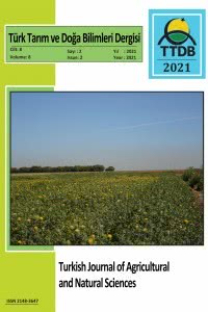An Aspect Of Food Safety, Environment Pollutıon And Agriculture Contamination With Supplyıng Energy Sources
An Aspect Of Food Safety, Environment Pollutıon And Agriculture Contamination With Supplyıng Energy Sources
-,
___
- Adams, C., Microbial concerns of the North and South American Countries and scientific implications for harmonizing free trade. Dairy Food Environment and Sanitary, 14 (8), 1994, 471-472. Aguliaro, F
- M., Alcayde A., Montoya, F. g., Sierra, A zapoto, Gil, C., Scientific production of renewable resources in meeting Turkey’s energy-related challenges, renewable and sustainable Energy Reviews 14, 2010, 2710-2722.
- Çağlarırmak,N., Food safety and quality control assurance in the harvesting and in the environment conditions, International Workshop on Food Safety in a Sustainable Postharvest System of Agricultural Products, 16 –18 October, 2007 Kahramanmaraş.
- Çağlarırmak, N., Reflects of Energy productions, upon environment food and health, 14 th International energy and environmental technology systems fair and conference, 15-17 mayıs, 2008, İstanbul wow center.
- Çağlarırmak, N., Hepçimen, A. Z., Kahyaoğlu, C. The polycyclic (PAH) International conference on Plants and Environmantal Erciyes Üniversitesi, Fen Edebiyat Fakültesi, Temmuz, 2009, Kayseri. effects of aromatic hydrocarbons on ecolological system, Pollution (ICPEP), Bioloji Bölümü, 6-11
- Çağlarırmak, N., The advanced methods in food safety quality control analysis, ISTEC International Science and Technology conference-2010, Northern Turkish Cyprus M agosa, 2010, 27-29.
- Çapik, M., Yılmaz , A.o., Çavuşoğlu İ., Present situation renewable energy in Turkey, 46, 2012, 1- role of
- Erdem, Z.. B., The contribution of renewable and sustainable Energy reviews 14 2010, 2710-2722.
- Ferstein F. KaÈ 1 & Abdussalam M. ,Food safety in the 21st century, Bulletin of the World Health Organization, 1999, 77 (4). : 347–351.
- Issues_papers/WSFS:Backgroundpaper s_feeding_The online 14.12.09. executive 200 Rome: FAO. worldpdf, available James, S. J., James, C., The food cold chain and change, climate International, 43, 2010, 1944-1956. research
- Kluska, M., Soil contamination with polycyclic aromatic hydrocarbons in the vicinity of the ring road in Siedlce City, Polish Journal of Environmantal Studies 12 (3), 2003, 309-313. Lambrou, Y.,
- Piana, G., Energy and Gender Issues development. Rome: FAO. 2006.
- McMichael, A. J Powles, J.W, Butler, C. D., Uauy, R., Food, livestock production, energy, climate change, and health, The lancet, 370, 2007, 1253-1263.
- McLachlan, M.S., Biological uptake and transfer of polychlorinated dibenzo-p- dioxins Environmental Science and Technology 6, 19 31-52. Merican, Z., Dealing with an expanding global food Production, 59 (10), 1996, 1133-1137. of Food
- Molins, R. A., Matarjemi, Y., Koferstein, F.K., Irradiation: a critical control point in ensuring the microbiological safety of raw foods, Food Control 12, 2001, 347- 3 Miraglia, M.,
- Marvin H.J.P., Kleter, G.A., Battilani, P., Brera, C., Coi, E., Cubadda, F., Croci, L., Santis B. D., Dekkers, S.,, Filippi, L., Hutjes, R. W. A., Nordaam, M.Y., Vespermann, A. Climate change and Food safety: An emerging issues with special Chemical Toxicology, 47, 2009, 1009- 10 G. J., focus Europe., Food
- Smith, M. R., Konig A., Environmental risk assessment substances, Food Control, 21, 2010, 1588-1600. related
- Tirado, M.C., Clarke, R., Jaykus, L. a., McQuarters-Gallop, A., Frank, J. M., Climate change and Food Safety; A review. Food research International 43, (2010), 745-765.
- Tirado, M.C., Cohen, M.J., Aberman, N., Merman, challenges of climate change and biofuel production for food and nutrition International 43, (2010), 1729-1744. Research Wilkinson P,
- Smith, K. R, Joff M., Haines A. Global perspective on energy: health effects and injustices, the Lancet, 370, 15-21, 966-978. 2007. DOI: 1016/S0140-736(07)61252-5
- ISSN: 2148-3647
- Yayın Aralığı: 4
- Başlangıç: 2014
- Yayıncı: Prof. Dr. Mevlüt AKÇURA
Rice Breeding For Herbicide Resistance In Turkey
Halil SÜREK, Necmi BEŞER, Recep KAYA, Rasim ÜNAN
Korunan ve Otlatılan İki Farklı Doğal Alanın Verim ve Kalite Açısından Karşılaştırılması
Erdal ÇAÇAN, Ali AYDIN, Mehmet BAŞBAĞ
Phenolic Compounds and Uses in Fruit Growing
Valentina ENCHEVA, Julia ENCHEVA, Nina NENOVA, Daniela VALKOVA, Galin GEORGIEV, Penka PEEVSKA, Georgе GEORGIEV, Pepa SHINDROVA
Diana KIRIN, Dimitrinka KUZMANOVA
Feasibility of Vegetable Drying Technic by Geothermal Heating at City of Kirsehir
Hakan BAŞAK, Seher Yıldız MADAKBAŞ, Gül GÜRDAL
Diana KIRIN, Vladimira HANZELOVÁ, Sonya SHUKEROVA, Dimitrinka KUZMANOVA
Anticancer Natural Derived from Medicinal Herbs
Wafa SOUDANİ, Rachid DJAFER, - FATMA, Z Hadjadj AOUL, Mohamed ABDAOUİ
